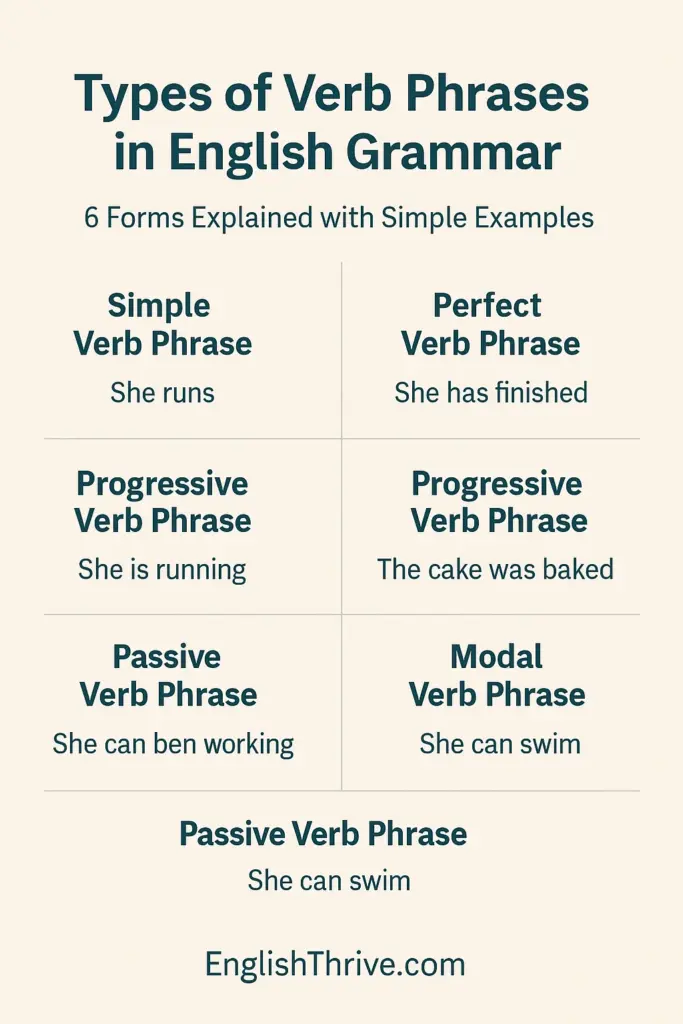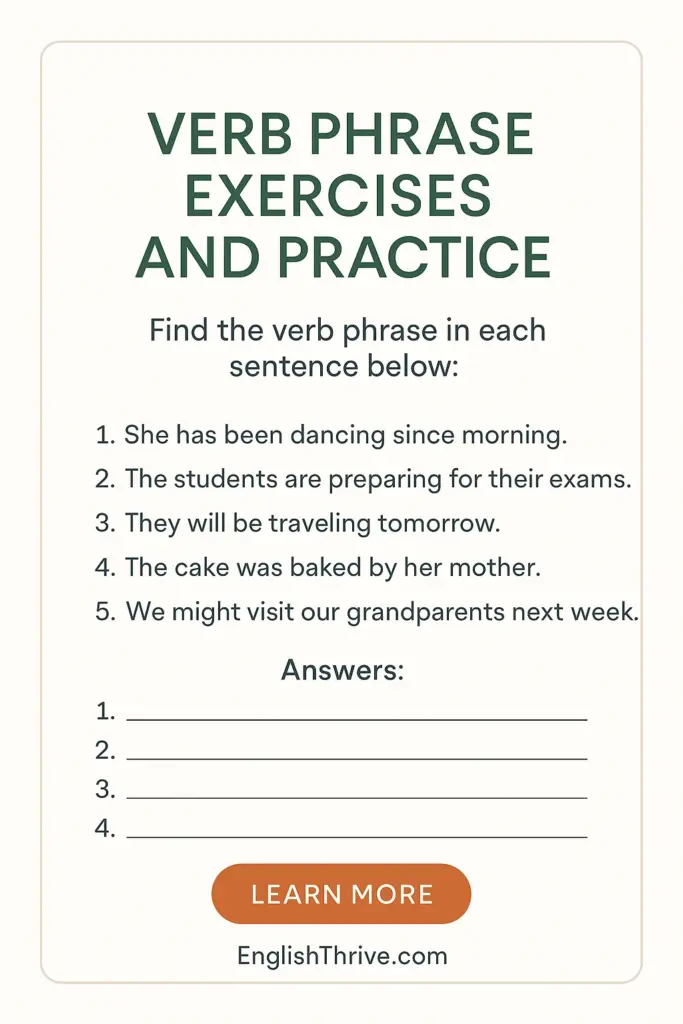A verb phrase is an important part of English grammar that expresses what the subject is doing or the state of being. It includes a main verb and one or more helping (auxiliary) verbs or modifiers.
For example:
She has been studying English for three hours.
Here, “has been studying” is the verb phrase—it shows both the action and the time of the action.
In this article, you’ll learn the definition, types, structure, and examples of verb phrases with easy explanations for students and ESL learners.
Contents
ToggleWhat is a verb phrase?
A verb phrase is a combination of a main verb and any auxiliary or helping verbs. Together, they convey the action or state of being of the subject. Verb phrases can also include modifiers, which help describe how, when, or to what extent an action takes place. For example, in the sentence “She has been working hard,” the verb phrase is “has been working,” which shows the action and time frame of the action.
Verb phrases can be categorized into different types based on their structure and function. Each type serves a distinct role in expressing tense, voice, mood, and aspect.
Types of Verb Phrases
There are several types of verb phrases, each with a unique structure and purpose in a sentence. Let’s break them down:
1. Simple Verb Phrase
A simple verb phrase consists of only the main verb. It expresses a simple action or state of being without any auxiliary verbs.
Examples of simple verb phrases:
She runs every morning.
He sings beautifully.
They dance gracefully.
Key Points:
Simple verb phrases contain only the main verb.
They express basic actions or states without any added modifiers or auxiliary verbs.
2. Perfect Verb Phrase
A perfect verb phrase combines a form of “have” (as an auxiliary verb) with the past participle of the main verb. This type of verb phrase indicates that an action has been completed at some point in the past or is relevant to the present.
Examples of perfect verb phrases:
She has finished her homework.
They had left by the time I arrived.
I have seen that movie before.
Tips:
The auxiliary verb “have” is combined with the past participle.
It is used to describe actions completed at various times.
3. Progressive Verb Phrase
A progressive verb phrase uses a form of “be” as an auxiliary verb and the present participle of the main verb. It indicates an ongoing or continuous action happening at a particular moment in time.
Examples of progressive verb phrases:
She is running right now.
They were studying all night.
I am reading a book.
Key Points:
The auxiliary verb “be” is used with the present participle (verb + ing).
It is used to describe actions in progress.
4. Perfect Progressive Verb Phrase
A perfect progressive verb phrase combines “have” and “be” as auxiliary verbs with the present participle of the main verb. This structure describes actions that were ongoing in the past but have now been completed.
Examples of perfect progressive verb phrases:
She has been working all day.
They had been traveling for hours.
We have been waiting for the bus.
Key Points:
Combines “have” and “be” with the present participle.
Indicates an action that was ongoing but is now finished or relevant to the present.
5. Passive Verb Phrase
A passive verb phrase focuses on the action being done to the subject rather than the subject performing the action. It uses a form of “be” as an auxiliary verb and the past participle of the main verb.
Examples of passive verb phrases:
The cake was baked by my mom.
The letter has been written.
The book is being read by the children.
Key Points:
Passive voice emphasizes the action rather than the doer.
It uses “be” + past participle.
6. Modal Verb Phrase
A modal verb phrase includes a modal verb (such as can, could, will, would, shall, should, may, might, or must) followed by the base form of the main verb. This type of verb phrase expresses necessity, possibility, permission, or ability.
Examples of modal verb phrases:
She can swim very fast.
They must leave immediately.
I might go to the party.
Key Points:
Modal verbs help express possibility, permission, or necessity.
They are followed by the base form of the main verb.
Summary Chart of Verb Phrase Types
| Verb Phrase Type | Example | Usage |
|---|---|---|
| Simple Verb Phrase | She runs. | Expresses a simple action or state of being. |
| Perfect Verb Phrase | She has finished. | Indicates a completed action with the help of “have.” |
| Progressive Verb Phrase | She is running. | Describes an ongoing action with the help of “be.” |
| Perfect Progressive Verb Phrase | She has been working. | Describes an action that was ongoing and completed. |
| Passive Verb Phrase | The cake was baked. | Emphasizes the action rather than the doer. |
| Modal Verb Phrase | She can swim. | Expresses necessity, ability, or possibility. |
Verb Phrase vs Verb Clause
A verb phrase is the part of a sentence that contains the main verb and its helping verbs, while a verb clause includes both a subject and a verb phrase.
| Example | Description |
|---|---|
| Verb Phrase: is reading a book | Part of the clause that shows the action |
| Verb Clause: She is reading a book. | A complete sentence with subject + verb phrase |
Notes: Every verb clause has a verb phrase, but not every verb phrase is a complete clause.
Main Verbs vs Auxiliary Verbs
Verb phrases are built from main verbs and auxiliary verbs. The table below shows the difference:
| Type | Example | Function |
|---|---|---|
| Main Verb | run, sing, write | Shows the main action or state |
| Auxiliary Verb | is, has, will, can | Helps form tense, voice, or mood |
| Modal Auxiliary | can, could, might, must | Expresses ability, possibility, or necessity |
How to Use Verb Phrases in Sentences
Verb phrases are essential for constructing clear, precise, and grammatically correct sentences. They help convey the actions, states, and relationships between subjects and verbs. Here’s how you can use different types of verb phrases in your writing:
1. Demonstrating Actions
Use verb phrases to show what the subject is doing in a sentence. Verb phrases can be used to express both simple actions and ongoing processes.
Examples:
He is studying for his exams.
They have finished their homework.
2. Describing Conditions
Verb phrases also help describe the state or condition of the subject, whether it’s a permanent state or a temporary situation.
Examples:
The cat is sleeping on the sofa.
She had been feeling sick all day.
3. Conveying Tense
Verb phrases are crucial for indicating when an action took place—whether in the past, present, or future. They help express the timing of the action.
Examples:
I will call you later. (future)
She has been working all day. (present perfect progressive)
They were running yesterday. (past progressive)
4. Forming Questions
In English, verb phrases are essential for forming questions. The auxiliary verb in the verb phrase often gets inverted with the subject to create questions.
Examples:
Are you coming to the party tonight?
Have you finished your assignment?
5. Creating Negative Statements
Verb phrases are also important when expressing negative statements. The word “not” is often placed within the verb phrase to negate the action.
Examples:
She has not completed her project yet.
They were not listening to the instructions.
6. Expressing Ability, Permission, or Possibility
Modal verbs in verb phrases can express the subject’s ability, permission, or the possibility of an action taking place.
Examples:
He can swim very fast. (ability)
You may leave early today. (permission)
She might join us for dinner. (possibility)
7. Adding Specific Details
Verb phrases can be enhanced by adding adverbs to provide more details about the action. These adverbs can describe how, when, or where the action happens.
Examples:
She is working hard to finish the project.
We have been studying for hours.
8. Creating Passive Constructions
Verb phrases in the passive voice shift the focus from the doer of the action to the receiver of the action.
Examples:
The letter was written by Sarah.
The song is being played on the radio.
Verb Phrase Exercises and Practice
Now that you know the types and uses of verb phrases, test your understanding with these quick exercises.
Exercise 1: Identify the Verb Phrase
Find the verb phrase in each sentence below:
She has been dancing since morning.
The students are preparing for their exams.
They will be traveling tomorrow.
The cake was baked by her mother.
We might visit our grandparents next week.
Answers:
has been dancing
are preparing
will be traveling
was baked
might visit
Exercise 2: Rewrite the Sentences
Change these simple verbs into verb phrases:
| Simple Verb | Rewrite Using a Verb Phrase |
|---|---|
| run | is running |
| eat | has eaten |
| read | has been reading |
Tips for Using Verb Phrases Effectively
To ensure your verb phrases are used correctly, follow these tips:
Choose the Right Tense: Make sure the verb phrase accurately reflects the time of the action.
Be Clear and Concise: Avoid using unnecessary words in your verb phrases. Keep them simple and to the point.
Use Modals Appropriately: Use modal verbs to express necessity, ability, permission, or possibility. Don’t overuse them.
Form Negative Statements Correctly: Place “not” in the correct position within the verb phrase to form negative sentences.
Ask Questions Properly: Invert the subject and auxiliary verb to form questions effectively.
Emphasize with Passive Voice: Use passive constructions when you want to focus more on the action rather than the doer.
Use Progressive Forms for Ongoing Actions: Combine “to be” with the present participle to show actions that are currently in progress.
Add Adverbs for Detail: Include adverbs in your verb phrases to add more detail about how, when, or where an action occurs.
Practice Consistency: Ensure that verb phrases remain consistent in tense and structure within your writing.
Common Questions About Verb Phrases
What is a verb phrase?
A verb phrase includes a main verb and its auxiliaries (helping verbs), along with any modifiers. Examples include “has been working,” “is running,” and “will travel.”
How Do You Identify a Verb Phrase?
To identify a verb phrase, look for the main verb and any auxiliary verbs or modifiers. For example, in “She has been reading,” the verb phrase is “has been reading.”
Is “could” a verb phrase?
Yes, “could” is part of a verb phrase. It is a modal verb combined with the main verb in its base form. For example, “could run” or “could swim.”
Can a Verb Phrase Be a Clause?
Yes, a verb phrase can function as the predicate in a clause, describing the subject’s action or state. For example, “She is dancing” is a verb phrase that forms the predicate in the clause.
What Is Another Name for a Verb Phrase?
Another term for a verb phrase is a “compound verb,” particularly when it involves multiple auxiliary verbs like in “has been studying.”
Can a Verb Phrase Be an Adjective?
No, a verb phrase functions as a verb, not as an adjective. However, verb phrases can sometimes modify nouns when used in a passive construction, indirectly describing or qualifying the noun.
Conclusion
Verb phrases are essential for constructing grammatically sound sentences in English. They allow you to express actions, conditions, questions, and much more. Understanding the different types of verb phrases—such as simple, progressive, perfect, and modal—will enable you to express yourself more effectively. Whether you’re writing or speaking, mastering verb phrases is a critical step toward becoming fluent in English grammar.



